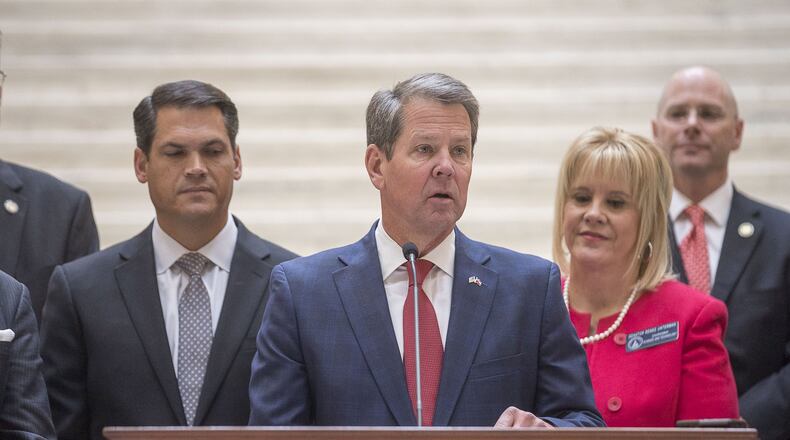Gov. Brian Kemp is nearing a decision as a key deadline approaches about whether Georgia will accept refugees for resettlement amid enforcement of a more restrictive policy unveiled by the Trump administration.
The executive order by President Donald Trump requires state and local governments to provide written consent to the federal government if they want to accept refugees, giving state officials new powers to block them.
Kemp’s decision could affect as many as 1,052 people who are fleeing persecution in their home countries and who could be brought to Georgia this fiscal year, according to the Coalition of Refugee Service Agencies. But Kemp has stayed largely silent on the issue, aside from suggesting he has some flexibility with his timeline. He said in an interview with The Atlanta Journal-Constitution that it “seems like a lot of what’s been reported on deadlines and what needs to be done is not correct,” though he and his office didn’t elaborate.
Refugee settlement agencies have scrambled since Trump’s Sept. 26 order to secure letters from states publicly saying they’ll accept refugees. Those documents are crucial to the federal funding requests they are piecing together before a Jan. 21 deadline.
Forty-two states — many led by Republican governors — have either issued such letters or have indicated they will do so, according to Church World Service, a refugee resettlement agency. Dozens of cities and counties across the nation have done the same. Kemp is among a handful of state leaders who has not yet taken a stance.
It’s set off a thorny political debate in Georgia, where Kemp is under pressure from conservatives eager to remind him of his pledge to crack down on illegal immigration and round up “criminal illegals” in his pickup truck.
“On one hand, you should reward the people who are seeking to come here legally who are having problems with their homeland,” said Kay Godwin, head of Georgia Conservatives in Action and a prominent Republican activist. “But it can be disturbing to their local communities. People can resent that — and the benefits that refugees are getting. And it goes against a drive to reduce immigration overall.”
They’re opposed by some evangelicals, along with key Democratic leaders, who say Georgia has a moral obligation to help refugees and who have cast it as a crucial economic boost for some struggling communities.
“They are invited guests of the United States as part of our tradition of a nation of welcoming those who are oppressed. They have been thoroughly vetted before they land on American shores through a very extensive process,” said Jim Neal, chairman of the Coalition of Refugee Service Agencies, who met with Kemp’s staff about the issue late last year.
“Then they arrive ready to work. And they go to work. They build new lives in the United States,” said Neal, who is also director of operations for Friends of Refugees, a Christian community development organization. “In Georgia, they are particularly important to some of the state’s key industries: poultry processing, hospitality, manufacturing and distribution and others.”
Your move, Georgia
Trump signed his executive order the same week his administration announced it was cutting to 18,000 the number of refugees who will be given safe haven in America this fiscal year, down from 30,000 in the fiscal year that ended in September and 45,000 the year before that. The Obama administration set a goal of 110,000 for fiscal year 2017. At the time of his announcement, the Trump administration said the U.S. was already at its limit.
"You should be able to decide what is best for your own cities and for your own neighborhoods, and that's what you have the right to do right now," the president said of the policy at an October rally.
The issue has long been divisive in Georgia. In 2015, then-Gov. Nathan Deal cited terrorism concerns when he signed an order seeking to halt the resettlement of Syrian refugees in Georgia, joining 30 other state leaders who sought to block them from coming. But at the time, the governor had no legal power to do so. Deal was forced to rescind his order after the state's top lawyer wrote in an opinion that the state doesn't have the legal authority to block Syrian refugees "no matter how well-intended or justified the desire to carve out such refugees might be."
White House officials say the refugee applicants admitted to the U.S. are subject to strict background checks and screened by fraud detection and national security officers. Last fiscal year, 1,189 refugees were resettled in Georgia, up from 837 the year before. The largest numbers last year came from Afghanistan, the Democratic Republic of Congo, Myanmar, Eritrea and Ukraine. In all, 30,000 refugees were resettled nationwide in the same time frame.
Newly granted with the power to decide whether they want to participate in a resettlement program, some local governments have already laid out the welcome mat.
“America has a well-documented history of helping the downtrodden in their times of need, and to turn our backs on those who are suffering is to turn our backs on the highest ideals of freedom in this nation,” Atlanta Mayor Keisha Lance Bottoms said last month.
Clarkston Mayor Ted Terry, a Democratic candidate for the U.S. Senate, urged supporters to lobby Kemp to “uphold Georgia’s 40-year tradition of welcoming the world’s most persecuted.”
Other destinations for refugees, including Gwinnett County, have not announced decisions, though Chatham County has agreed to accept them.
The Latest
Featured




